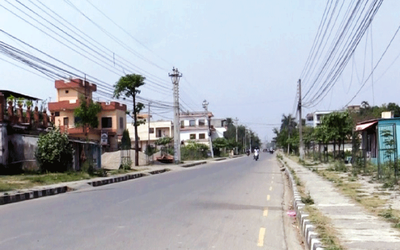Although Chandi Shrestha retired as the secretary for Home Affairs five years ago, he continued his active life with patience and zeal. Shrestha moved to the private sector. He joined the board of directors of Spice Nepal Pvt.Ltd, a major telecom service provider in the country. Shrestha started his stint in civil service as a section officer in 2034. He rose in the ranks of bureaucracy to become the frontrunner for the post of chief secretary of the government after Bimal Prasad Koirala retired from the post. The royal government refused to appoint him at the head of all civil servants. Shrestha spoke to KESHAB POUDEL on issues of bureaucracy then and now.
Excerpts:
It is said that Nepalese civil service is completely politicized. How do you view it?
You cannot separate administration and politics. Frankly speaking, civil service is the helping hand of politics. You cannot say that you can make administration hundred percent clean and away from politics. We can only ascertain a tolerable limit to it. Whether one likes it or not, one of the major parts of bureaucracy is to support politics. Even in normal periods of time, you cannot completely stop political interference. At present, the country has been passing through a transitional phase and the level of political interference will be more. In many cases, the bureaucracy needs to guide politics because it is the permanent and stable government. One of the fundamental responsibilities and jobs of bureaucracy is to implement the rule of law and to work under it. It is unfortunate that the present leadership of the administration is unable to do so.
You also held the position of Home Secretary and political parties are accusing that the police administration is politicized too and it fails to perform its duty to establish law and order. How do you look at this situation?
I cannot say that the police are not functioning. Of course, there may be some lapses and some faults. In a force of more than 50,000, one cannot rule out minor mistakes and lapses. As former home secretary what I can say is that Nepal Police is doing quite a good job. The problem with police and bureaucracy is that they are not abiding the rules and laws but what they have been doing is how to make the work easier for ministers. One of the functions of police is to maintain law and order and rule of law.
At a time when every one has been saying that there is rampant politicization of police and bureaucracy, you have said that nothing like this is there. Then what is there?
This kind of situation is there all the time. We always have short memory. There was politicization in bureaucracy and police all the time. Only concern is the level. I can say that the level of political intervention is higher now than in the past.
If all our bureaucracy and police work under the rule of law, everything will be alright. For instance, there is widespread criticism in the implementation of law. Though they entered mainstream politics more than four years ago, the rebels are still following their own rule. There is discrimination in dealing with common citizens and rebels in same cases. If a rebel commits the act against the law, he is simply acquitted terming it as a political case. Whether it is a murder or kidnapping, a rebel gets more privilege. This kind of situation must end and rebels too need to be brought under the rule of law. As long as home ministry cannot be functional, other ministries cannot do anything. Due to its main role in the country’s day to day affairs, every political party wants to have home ministry under it. It is a very important ministry. There are 150,000 employees involved in Home Ministry and it is very important.
There is a decline in the prestige of civil servants. Who is responsible for this?
The civil servants themselves have to take responsibilities for this. Due to failure of civil servants to work as per the responsibility given to them by laws, it is weakening. The secretaries are now working as private secretaries. Other reason is the distribution of portfolio under the basis of political inclination. This eroded the values down to line. There is a tendency now to select Afna Manche (one’s henchmen) rather than capable men. The third attack is coming from INGOs and NGOs which are rocking the system to suit their own interest. In this context, the civil service is in complete humiliation.
Don’ you think it was unjust when you were denied the post of chief secretary despite your seniority?
Of course, I was the most appropriate person for the post of chief secretary but then government took the decision otherwise. I was not representing the aristocratic family and I was just a son of an ordinary citizen. This is the reason I was rejected. I did not feel humiliation but I feel a kind of pride.
When you were the home secretary, you singed the initial document of the Nepal-India Extradition Treaty. How was the document?
The document which I signed was completely a document which, I can claim, protected Nepal’s interest. I am unhappy with the failure of the government of Nepal and India to sign and implement the final agreement. The treaty represents Nepal's national interest. If you add something more, I cannot say how it will be. Extradition treaty itself is not bad but it is the content and clauses which will make the difference.
(He is the chairman of Nepal-JICA Alumni Association as well as he is also chairperson of the Dhulikhel Community College)
- TANAHU HYDROPOWER PROEJCT: A Significant Achievement
- Apr 15, 2024
- AMBASSADOR HANAN GODAR: Sharing Pain With A Nepali Family
- Mar 30, 2024
- VISIT OF KfW AND EIB TO NEPAL : Mission Matters
- Mar 25, 2024
- NEPAL BRITAIN SOCIETY: Pratima Pande's Leadership
- Mar 24, 2024
- NEPAL ARMY DAY: Time To Recall Glory
- Mar 15, 2024
















